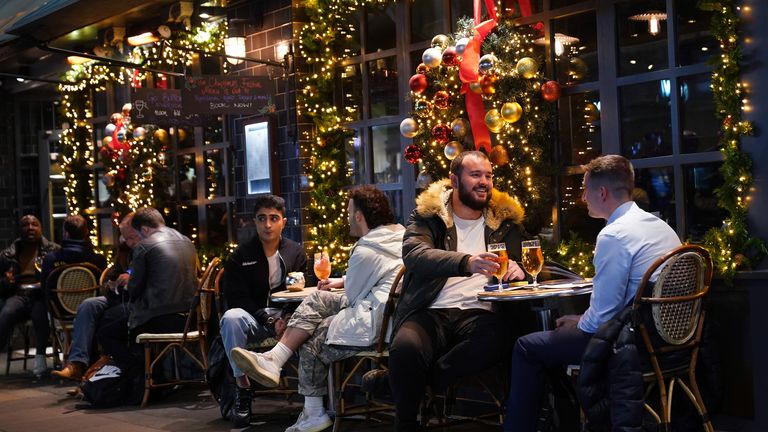UK business growth has slumped to its weakest pace since February thanks to tighter restrictions and renewed uncertainty as the Omicron variant spreads, closely-watched survey data suggests.
Travel and hospitality firms were particularly affected by a “negative impact” from the new rules, according to the monthly purchasing managers’ index (PMI) compiled by IHS Markit.
It is the latest sign of Omicron holding back Britain’s economic recovery as the chancellor faces pressure for fresh government support for the worst-hit sectors.
0:51 Uber sees weaker demand amid Omicron adviceUber: Dampening of demand’ over Omicron
Meanwhile, ride-hailing app Uber told Sky News that it had seen “a little bit of dampening of demand” as its customers respond to public health messaging about the variant’s spread.
AdvertisementJamie Heywood, Uber’s regional general manager for Northern and Eastern Europe, told Sky’s Ian King Live how it had been affected by the new variant’s spread.
“We are seeing a little bit of dampening of demand,” Mr Heywood said.
More from Business“People are listening to the advice and going out a bit less but it’s smaller compared to what we’d seen earlier this year and in the first wave.
“It’s pretty well nationwide. I think everyone is listening to the same news.
“We are probably seeing greater caution in London just by virtue of where the cases are.”
Economic growth this month ‘eased considerably’
The “flash” PMI survey, covering a period from 6-14 December, gave a reading of 53.2 – where the 50 mark separates growth from contraction – down from 57.6 in November.
That was the lowest since February when Britain was still in the grip of lockdown.
It comes after recent Office for National Statistics data showed that Britain’s recovery from the pandemic economic collapse of last year had slowed to a crawl in October, even before the arrival of Omicron.
The latest PMI report said that growth this month “eased considerably in response to tighter pandemic restrictions and renewed business uncertainty”.
It said the services sector – which represents four-fifths of UK output from bars and hotels to law firms and accountants – suffered “negative impact on consumer demand from tighter COVID-19 stringency measures and renewed travel restrictions”.
Image: Travel businesses were hit by restrictionsManufacturing uptick as supply chain delays ease
However, there was a ray of light from manufacturing, which saw a small uptick as months of supply chain delays started to ease.
Chris Williamson, chief business economist at IHS Markit, said: “The flash PMI data show the UK economy being hit once again by COVID-19, with growth slowing sharply at the end of the year led by a steep drop in spending on services by households.
“With COVID-19 infections set to rise further in coming weeks due to the spread of the Omicron variant, and more restrictions being introduced, the pace of economic growth looks likely to continue to weaken as we head into 2022.”
Separately, weekly ONS data providing a snapshot of UK economic activity pointed to declines in restaurant diner levels, retail footfall and transactions at Pret A Manger stores in London airports.
Pub chain Wetherspoons, electricals to mobile retailer Currys and online fashion firm Boohoo are among businesses already warning of an Omicron hit.
